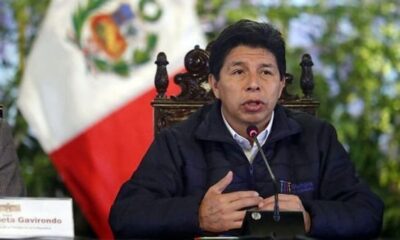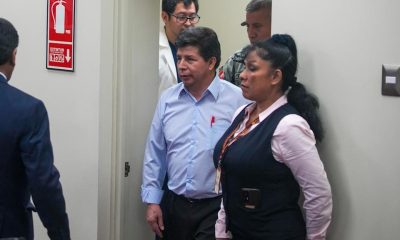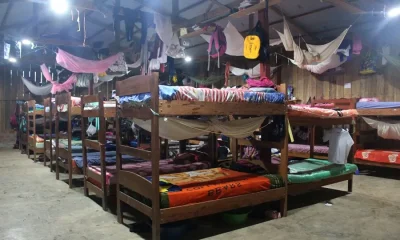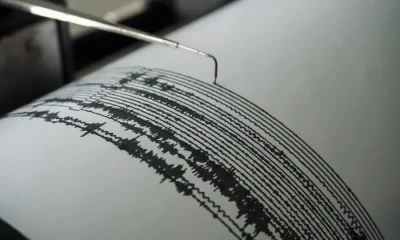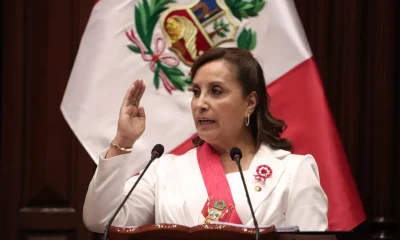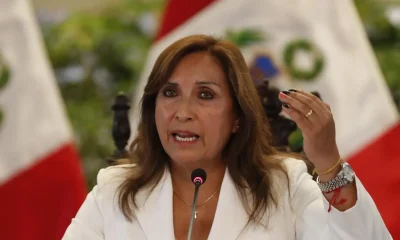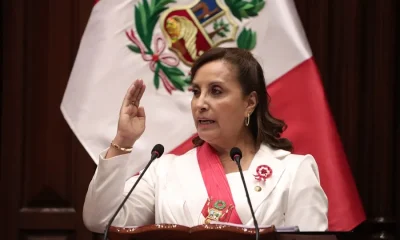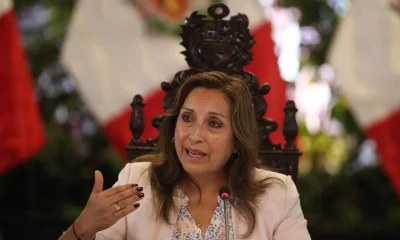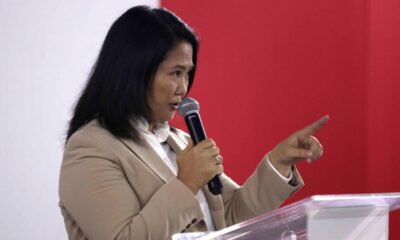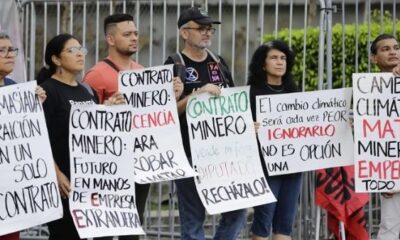International
Peru president insists ‘I will not resign’ as protests continue
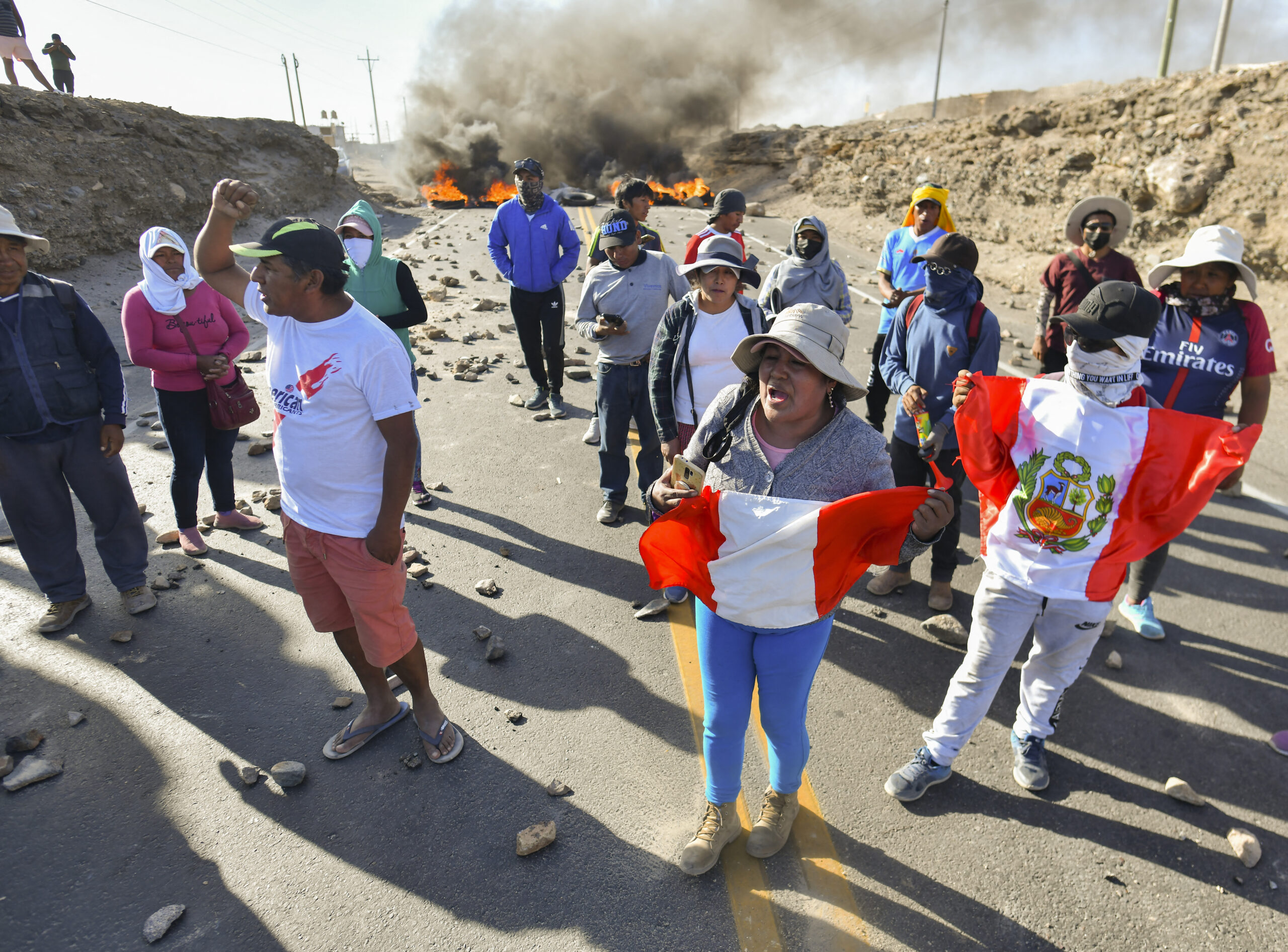
January 14 | By AFP | Luis Jaime Cisneros |
Peruvian President Dina Boluarte insisted Friday she will not step down, after another day of protests and roadblocks throughout the country saw calls for her resignation and the arrest of a trade union leader with supposed links to Maoist rebels.
Supporters of ousted president Pedro Castillo have marched and barricaded streets around the South American country since December, demanding new elections and the removal of Boluarte, his successor and former vice president.
“Some voices that have come from the violent and radical factions are asking for my resignation, provoking the population into chaos, disorder and destruction,” Boluarte said in an address broadcast on state TV Friday night.
“I will not resign. My commitment is with Peru.”
Boluarte lamented that the protests have at times turned violent, as at least 42 people have been killed in clashes with security forces, including a police officer burned alive in a vehicle, while hundreds more have been injured.
“I cannot stop reiterating my regret for the deaths of Peruvians in these protests,” she said. “I apologize for this situation.”
But she rejected the possibility of calling a constitutional assembly as demanded by protestors, pointing to the difficulties Peru’s neighbor Chile has had in drafting and approving a new constitution.
“That cannot happen overnight,” Boluarte added.
Earlier on Friday, police in Peru announced the arrest of Rocio Leandro, a union leader from the south-central Ayacucho region with supposed links to Maoist rebels, who is accused of financing protests and recruiting demonstrators.
Police spokesman Oscar Arriola claimed the arrest of Leandro proved that remnants of the Shining Path Maoist rebels were involved in the protests.
Arriola claimed Leandro was a former Shining Path member known as “Comrade Cusi.”
Roadblocks and border closures
Protests and roadblocks have been registered in the capital Lima, and several southern and Andean regions.
Authorities say there are roadblocks in 10 of the country’s 25 departments.
A protest in the border city of Tacna, 1,200 kilometers (750 miles) southeast of Lima, led neighbor Chile to temporarily close the crossing between the two countries.
The city of Arequipa in the south — the second-largest in the country and one of Peru’s main tourist hotspots — had been practically blocked off from all transport links with the neighboring regions of Cusco and Puno.
On Thursday, authorities closed air and rail links to Peru’s famed Machu Picchu tourist site for the second time as protests flared up leading to clashes with police.
Several regional governors and professional associations, including lawyers and teachers, joined the calls for Boluarte to resign.
“How many more deaths will Dina Boluarte’s presence in the presidency cost?” asked Puno governor Richard Hancco, whose southern department has become the epicenter of clashes between protesters and security forces.
That region, close to the border with Bolivia, was where 18 people died following violent clashes on Monday night.
“No position can be above human life,” said Hancco.
Ministers resign
Opposition legislator Susel Paredes told local radio that time was running out for Boluarte and that the resignation of labor minister Eduardo Garcia on Thursday was “the beginning of the end” for the president.
Two other ministers resigned Friday, with the head of the Ministry of the Interior Victor Rojas and the head of the Ministry of Women Grecia Rojas immediately replaced by retired general Vicente Romero and Nancy Tolentino, respectively, at a swearing-in ceremony with Boluarte.
Garcia’s replacement Luis Alfonso Adrianzen was also installed.
Peru has been riddled with political instability in recent years.
Boluarte, 60, is the sixth person to hold the presidency in five years.
Castillo, who was being investigated in several fraud cases during his tenure, has been remanded in custody for 18 months, charged with rebellion.
International
Death toll from southern Spain train crash rises to 40
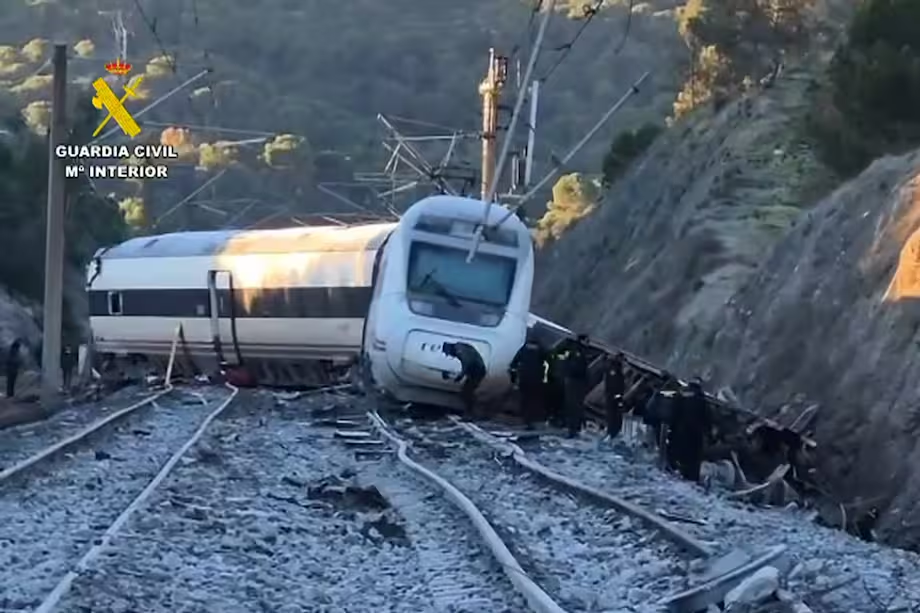
The death toll from the train accident that occurred on Sunday in southern Spain has risen to 40, according to investigative sources cited by EFE on Monday afternoon.
Since early Monday, search operations have focused on the damaged carriages of a Renfe train bound for Huelva, which collided with the last derailed cars of an Iryo train traveling from Málaga to Madrid after it left the tracks.
The crash has also left more than 150 people injured. Of these, 41 remain hospitalized, including 12 in intensive care units at hospitals across the Andalusia region.
More than 220 Civil Guard officers are working at the site, searching the railway line and surrounding areas for key evidence to help identify victims and determine the causes of the accident.
The tragedy has revived memories of the deadliest railway disasters in Europe in recent decades. In Spain, the most severe occurred on July 24, 2013, when an Alvia train derailed near Santiago de Compostela, killing 80 people and injuring 130 others.
At the European level, the worst rail disaster took place on June 3, 1998, in Eschede, northern Germany, when a high-speed train struck a bridge pillar at 200 kilometers per hour, resulting in 98 deaths and 120 injuries.
International
Spain’s Prime Minister pledges transparency after train crash kills at least 39
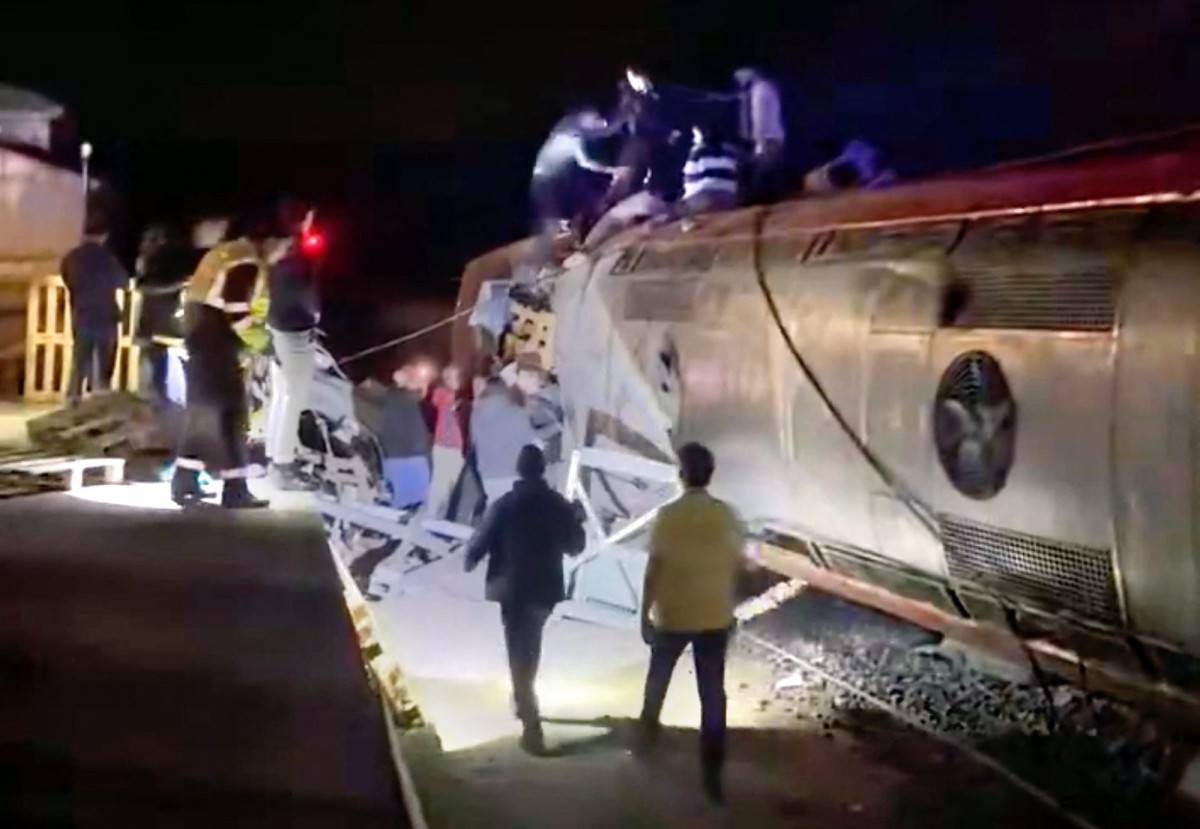
Spanish Prime Minister Pedro Sánchez pledged on Monday to ensure “absolute transparency” regarding the causes of a train crash that killed at least 39 people on Sunday in southern Spain, warning that the death toll could still rise.
The fatal accident occurred in the Andalusia region, where the number of confirmed deaths reached 39 by Monday morning, according to a spokesperson for the Ministry of the Interior.
Authorities were preparing to deploy heavy machinery to lift several derailed train cars. “We are waiting for cranes to be installed this morning to lift cars one, two and three of the Alvia train, which suffered the most damage,” said Andalusian regional president Juanma Moreno Bonilla on regional television. “It is likely that once they are lifted, we may find more victims,” he added.
The disaster also left more than 120 people injured. As of Monday afternoon, 43 victims remained hospitalized, including 12 in intensive care, according to emergency services.
International
Over 160 christian worshippers kidnapped in Kaduna Church attacks

More than 160 Christian worshippers were abducted on Sunday during coordinated attacks carried out by armed gangs on two churches in a remote village in Kaduna State, northern Nigeria, according to a cleric and a United Nations report accessed by AFP on Monday.
Nigeria, Africa’s most populous nation, has witnessed a renewed surge in mass kidnappings since November, prompting the United States government to carry out military strikes on Christmas Day in the northwestern state of Sokoto.
U.S. President Donald Trump accused Nigerian armed groups of targeting Christians, describing the violence as a form of “genocide” against the religious community.
According to Reverend Joseph Hayab, president of the Christian Association of Nigeria in the north, the attackers arrived in large numbers, blocked access to the churches, and forced worshippers to flee into nearby forests.
“The attackers came in large numbers, sealed off the entrances to the churches, and drove the faithful into the bush,” Hayab told AFP.
-

 International3 days ago
International3 days agoU.S. deportation flight returns venezuelans to Caracas after Maduro’s ouster
-

 International5 days ago
International5 days agoUkraine declares nationwide energy emergency amid russian attacks and extreme cold
-

 International5 days ago
International5 days agoX moves to block Grok from creating sexualized images of real people amid legal scrutiny
-

 International5 days ago
International5 days agoIran closes airspace amid U.S. threats and deadly nationwide protests
-

 International5 days ago
International5 days agoHillary Clinton skips Epstein inquiry as house panel threatens contempt charges
-

 International5 days ago
International5 days agoFrance joins Denmark’s ‘Operation Arctic Resistance’ in Greenland amid U.S. tensions
-

 Central America1 day ago
Central America1 day agoGuatemala prison uprisings leave 46 guards held by gangs
-

 International5 days ago
International5 days agoU.S.–Denmark tensions escalate as Trump pushes NATO to back U.S. claim on Greenland
-
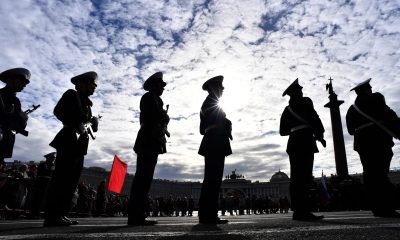
 International5 days ago
International5 days agoUK Intelligence estimates russian casualties in Ukraine at over 1.2 million
-
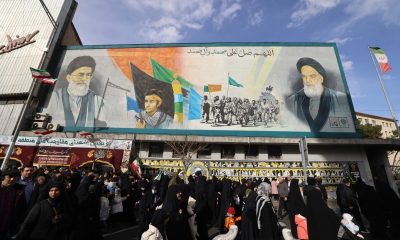
 International3 days ago
International3 days agoCanada accuses Iran of killing its citizen during anti-government unrest
-

 International8 hours ago
International8 hours agoDeath toll from southern Spain train crash rises to 40
-
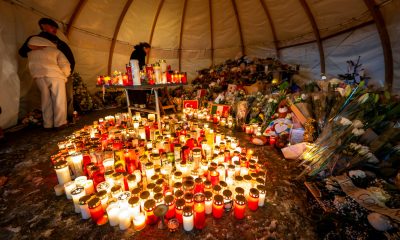
 International5 days ago
International5 days agoSwiss Canton of Valais Grants Emergency Aid to Victims of Crans-Montana Bar Tragedy
-

 International3 days ago
International3 days agoSheinbaum highlights anti-drug gains after U.S. says challenges remain
-

 Central America8 hours ago
Central America8 hours agoGuatemala raises police death toll to nine after gang violence escalates
-

 International8 hours ago
International8 hours agoOver 160 christian worshippers kidnapped in Kaduna Church attacks
-

 International1 day ago
International1 day agoChile declares state of catastrophe as wildfires rage in Ñuble and Biobío
-

 International3 days ago
International3 days agoFormer South Korean President Yoon sentenced to five years in prison
-

 International8 hours ago
International8 hours agoSpain’s Prime Minister pledges transparency after train crash kills at least 39

























